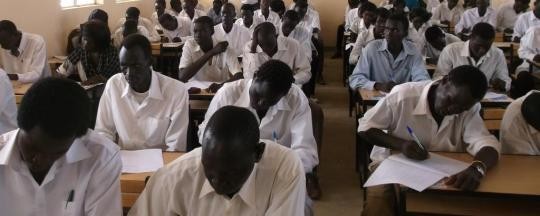Recently concluded exams for secondary school pupils throughout South Sudan may be invalidated if evidence of misconduct is found, reported the chair of the National Legislative Assembly’s education committee.
Samson Ezekiel said that the exams shall be nullified if it is established that any were leaked and students shall be called back to sit new examinations. Investigations into the matter are on-going in order to establish whether circulating rumours of misconduct are true.
Ezekiel claimed that although cancelling the national examinations sat last month by secondary school pupils would have a negative impact, South Sudan needs to have credible examinations that will be internationally recognised.
“We are still following up on this to see whether these examinations have got a fault and then it’s (for) the assembly to decide whether these examinations meet the standard and, if not, shall be cancelled,” he reported.
The Minister of General Education and Instruction, Joseph Ukell Abango, admitted that the examinations were carried out under difficulty.
Three states, including Unity state, had to photocopy exam papers due to insufficient papers. However, it was not specified whether the additional copies were produced by government institutions or in public printing shops where they may not have been secure.
Undersecretary Deng Deng Hoc Yai confirmed that the ministry did authorise the state ministry to form a committee, with supervision from the security forces, in order to photocopy additional papers. During this time, the Undersecretary claimed that students were kept in classrooms under strict supervision with no access to communication.
The shortage in papers came as a result, he claimed, of inaccurate data given by state ministries and dismissed rumours that pupils in Pariang county sat their exams at night or that photocopying was carried out in the market.
“Pariang county has got no power, did the students do their exams under the moon or did they use candles and lanterns to do their exams?” he questioned.
Yai added that such “accusations” were aimed at undermining the credibility of the examinations, potentially damaging the future of 18000 students who sat this year’s secondary certificate exams.
If it is later found out, claimed the Undersecretary, that there were irregularities in any centre, administrative measures shall be taken against the pupil, chief invigilator or headteacher. However, cancelling the examinations as a whole, he added, is an expensive exercise.
Other factors which led to the problems in distribution were the delays in the exam budget’s release by the Ministry of Finance and Economic Planning. The printer used at the ministry for production of the papers also has a low output so papers had to be printed in turns.
Other complaints about the examinations included schools receiving papers in the wrong language and incorrect exam questions.
South Sudan struck a memorandum of understanding with the Sudanese education ministry upon independence in 2011 in order to continue to use the Sudan Secondary Certificate until late 2014.
However, apparent issues of payment and the indexing of pupils in Juba earlier this year resulted in the agreement breaking down and in April Juba issued its own qualification, the South Sudan Secondary Certificate.
Related:
Secondary examination problems in WBeG & Upper Nile (2 May 2013)
South Sudan secondary exams begin despite challenges (23 April 2013)
Juba granted one month to register students for Sudan Secondary Certificate (2 February 2013)
South Sudan plans own Secondary Leaving Certificate: failed to meet Sudan’s deadline (31 January 2013)
RSS not prepared for Secondary School Certificate – Sudan Undersecretary for Education (29 January 2013)




